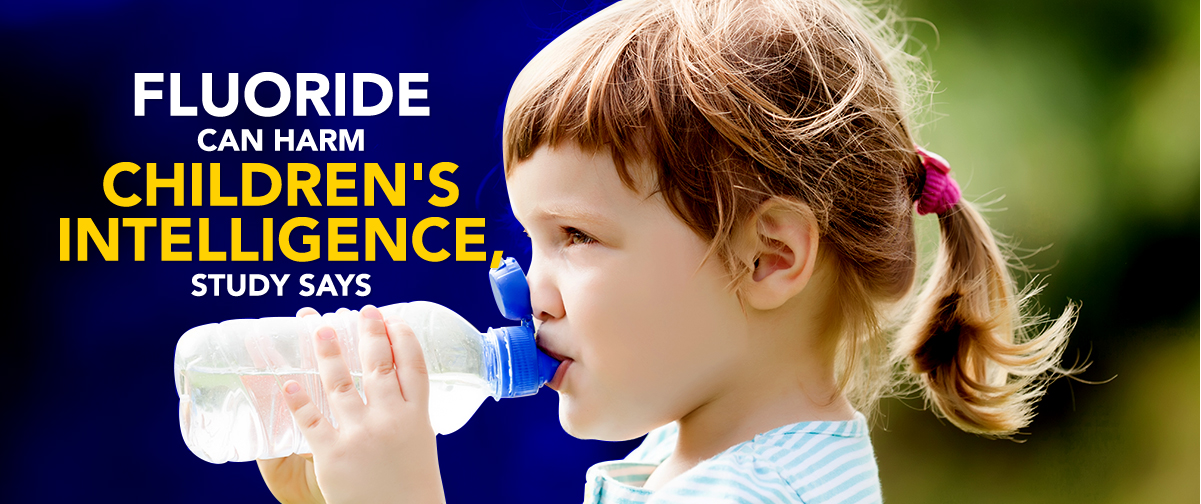Posted by Anne Joyce Raymundo on Nov 5th 2018
Fluoride Can Harm Children's Intelligence, Study Says

Fluoride exposure can affect children's cognitive development, according to a study published in Environmental Health Perspectives.
The Study
In Prenatal Fluoride Exposure and Cognitive Outcomes in Children at 4 and 6–12 Years of Age in Mexico, the researchers have tested and evaluated around 300 sets of mothers and kids for over one decade to learn their intellectual skills. The scientists discovered that people exposed to fluoride through water and salt products have lower IQ levels compared to non-Mexicans.
By testing the urine of kids and mothers in Mexico, the researchers found a drop in intelligence tests for 0.5 milligram per liter increase in fluoride. The authors also diagnosed that pregnant Mexicans can also suffer from the same intellectual issue.
Effects on Children
Aside from poor intelligence development, the researchers stated that children exposed to the chemical would likely get illnesses, such as teeth discoloration and skeletal fluoridation, a condition that affects the joints.
They said that other possible factors such as risk to different types of chemicals take into play during the experiment, and the diseases might affect children ranging from 4 to 15 years old.
According to Linda Birnbaum, National Institute of Environmental Health Sciences' director, the study has similar findings related to exposure from children in China, where the water's fluoride level is as high as 30-milligrams per liter.
Effects on Pregnant Mothers
While the study had stated that children would experience the said cognitive issues, it shows pregnant Mexicans might suffer from the same illness. In fact, pregnant had 0.90 milligram per liter in their urine that time. Compared to Poland, this statistic is high, considering that Mexico doesn't add use fluoride to public water supplies.
Fluoride at Public Water
The Environmental Protection Agency has set a limit of 4 milligrams of fluoride per water liter, and the US Public Health Service recommends 0.7 ml/l. Despite these limitations, more and more people are suffering from the fluoride-related disease. This holds not only in Mexico but also in the USA, wherein 75 % of Americans use tap water with this chemical.
And while the US Centers for Disease Control and Prevention has included water fluoridation as a tremendous public health achievement, no one can deny that this chemical provides many disadvantages as well.
This is probably the reason many states in America, including Portland, Oregon, and Tucson rejected water fluoridation.
Supporting Statements
"We should pay attention to this topic." – Birnbaum agreed to the study.
"Other scientists should see the bigger picture and reproduce this study to provide awareness- Dr. Angeles Martinez-Mier of the Indiana University School of Dentistry, the researcher involved with the study.
"This is a very well-conducted study, and it raises serious concerns about fluoride supplementation in water and other items," says Dr. Leonardo Trasande, a pediatrician expert in environmental exposures and wellness problems at New York University Langone Health.
More References
You can read several types of research which show the adverse effects of fluoride in human and environment online. Here are some:
WHO – Inadequate or Excess Fluoride
Semantic Scholar - Neurobehavioral effects of developmental toxicity
Journal of Neurology and Neuroscience
Conclusion
With all the information, what can you do to protect you and your family from the chemical? One way to stay safe and healthy is by avoiding fluoride-related products and installing a filter in your tap.
For more information regarding the study, visit the Environmental Health Perspectives' page. HTTP://ehp.niehs.nih.gov/doi/10.1289/ehp655
Clean Water Revival, Inc. has the highest rated fluoride reduction filters. Please call 800-444-3563 for further information.
Sources:
https://edition.cnn.com/2017/09/19/health/fluoride...
https://factor.niehs.nih.gov/2017/10/papers/fluori...

